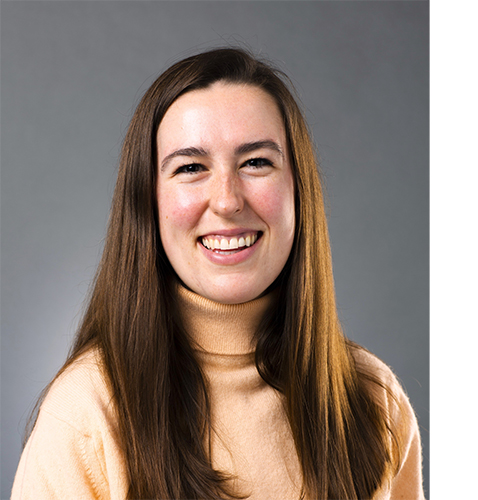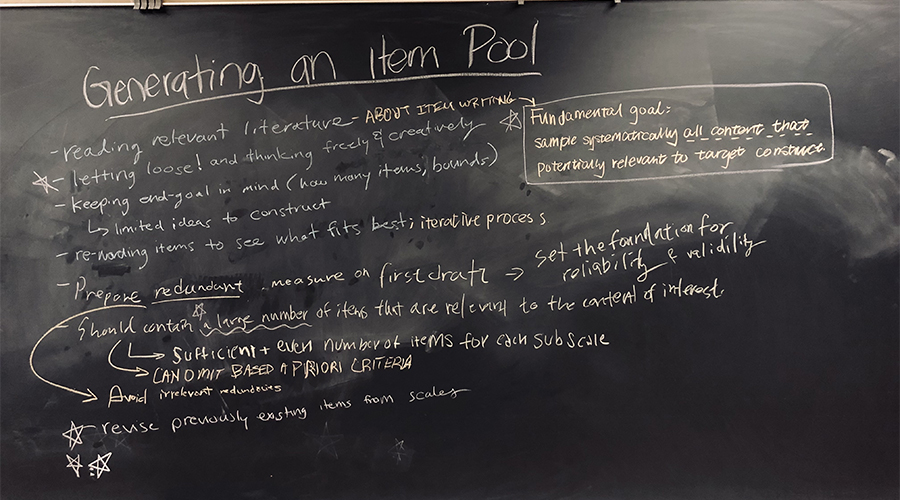Spotlight on Teaching: Seminar Introduces Undergraduates to Measurement in Psychology

This spring, Sarena Sabine, a fourth-year psychology PhD student in the quantitative area, designed and taught a new advanced undergraduate course titled, “An Imperfect Science: Evaluating Measurement in Psychology.” A key goal of the class was for students to learn how psychological self-report measures are developed and how to assess the validity and overall quality of these measures through both a theoretical and a statistical perspective.
How did this course come about? The summer before Sarena started UW’s Psychology Ph.D. program, she originally expected that her first-year research project would focus on developing a self-report rating scale for a new construct and potentially running a study using this new measure.
However, soon after starting her graduate training she realized that developing a high-quality, robust self-report measure takes a tremendous amount of time to do well— in her case, she spent over three years dedicated to working with a large research team to develop and assess the validity of the new measure. Trying to put a concrete metric around any type of abstract psychological construct is a huge challenge. But in Sarena’s case, it was this challenge that made this area of study all the more interesting, ultimately inspiring her to develop this course.
The course was designed to provide an opportunity for students to actively step into the world of research. Through lectures, regular in-class activities, discussions, readings, and guest lectures, students developed a nuanced understanding of the challenges and opportunities that come with the measures that psychologists use. Pictured below: a chalkboard activity that student groups engaged with on scale development, specifically generating an item pool.

Then, students applied what they were learning in class to their own class projects. To increase students’ agency and engagement in their projects, Sarena asked each student to pick a construct in psychology. Students chose a wide array of topics, including loneliness, altruism, and metacognition. Then, students found a self-report scale intended to measure this topic to focus on for their project. Similar to the work that researchers would do, the students evaluated the content validity of the scale, created new items, collected data, and analyzed data on their scales to draw conclusions about the quality of their measure. They then came up with the most important next steps to improving their scale, keeping in mind that their scale would be used in the global context of 2024.
Sarena began developing this class in the summer of 2023 and continued to develop course content and worked on it over the course of the academic year, while balancing her graduate studies and responsibilities as a TA. Her course development process first involved writing learning objectives and the class project. Next, the focus was on the course schedule, assignments, reading list, and lesson plans.
Overall, everyone whom Sarena spoke to when she was developing the class was extremely supportive. It was a privilege to have had her first teaching experience as instructor of record in a department with excellent support and opportunities for graduate students with a genuine interest in teaching. In particular, she wanted to thank her teaching mentor, Dr. Ann Culligan, and her research advisor, Dr. Brian Flaherty, for their guidance, wisdom, and support.
Overall, Sarena found it rewarding to teach such an engaged group of students and see their growth. She was encouraged by student feedback that they enjoyed the class and found the material useful and engaging. Sarena shared, “Even though measurement might not on the surface be as exciting as other areas of psychology, it is the cornerstone of psychological research. Gaining a deep understanding about measurement in the context of an area that students care about appears to be a strong approach to enhance learning.”